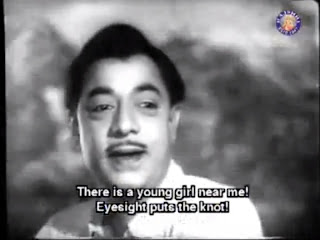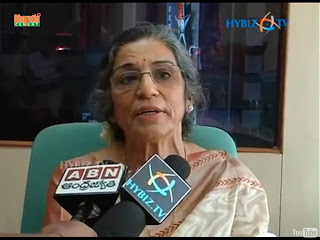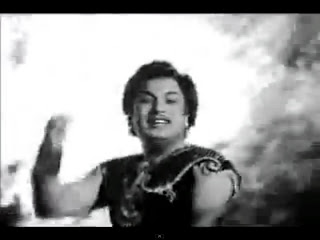Mrs.Shamshad Begum, one of the first Play Back Singers of Bollywood / Hindi Cinema, started singing in “Peshawar Radio” /All India Radio in Lahore from December-1947, through her musical group 'The Crown Imperial Theatrical Company of Performing Arts', set up in Delhi
Hearing the melodious voice of Shamshad Begam, some ‘Gramphone Companies’ made use of her voice for devotional songs-gramphone-Records.
Taking note of the unique voice of Shamshad Begem, the popular Hindi Music Directors Ghulam Haider (1908-1953), Naushad Ali and O. P. Nayyar used her voice in their Hindi movies.
Many of Shamshad Begum's songs of Hindi movies have been "remixed" by the Bollywood Music Directors, after Naushad (1919-2006) and O.P.Nayyar (1926-2007).
Shamshad Begum has sung a number of ‘devotional songs’ and ‘ghazals’ also.’
In the year 2009 Shamshad Begum was conferred the ‘Padma Bhushan’-Award and the prestigious-
“O P Nayyar award”- for her contribution to Hindi Film Music.
Shamshad Begum who was born on 14th April 1919 at Amritsar, Punjab, passed away at the age of 94 years old, on 23rd April 2013.
Hindi Actress-Saira Banu’s (Wife of Hindi Actor-Dilip Kumar) grand mother and mother of Hindi Actress Nazeem Banu , ‘Shamshad Begum’, who was a classical singer died in the year 1998.
At that time there had been a confusion with this Bollywood Play Back Singer, Shamshad Begum., who had been doing well.
The following is a List of Hindi Cinema Songs Sung by Shamshad Begum:
'Naina Bhar aye neer' in the movie - 'Humayun' (1945) starring Ashok Kumar and Nargis in the music of Ghulam Haider
‘Jab Usne Gaisou Bikhraye’-in the movie ‘Shah Jahan’ (1946)-starring K.L.Saigal and Ragini in the music of Naushad
‘Merijaan, Sunday ke Sunday’ in the movie‘Shehnai (1947) one of the first Westernised songs, in the music of C.Ramchandra
Dharti Ko Aakash Pukare' duet with Mukesh in the movie - 'Mela'(1948) starring Dili Kumar and Nargis in the music of Naushad
A multi-lingual song for P.Bhanumathi in the Gemini Films -movie ‘Nishan’ (1949)-starring M.K.Radha,Ranjan and P.Bhanumathi and Directed by S.S.Vasan in the music of M.K.Kalla and Rajeswar Rao
‘Morey Angana Mei’-A duet song with Moti in the Gemini Films movie-‘Nishan’ (1949)- starring M.K.Radha, Ranjan and P.Bhanmumathi in the music of M.K.Kalla and Rajeswar Rao
'Mere Piya Gaye Rangoon'- in- 'Patanga' (1949)- starring Nigar Sultana, Vimi, Raj Mehra, Raj Kishore, Ramesh Sinha- in the music of C.Ramchandra
Kisike Dil Mein Rehna Tha' with Lata Mangheskhar in the movie - 'Babul'(1950)-starring Dilip Kumar, Ashok Kumar and Nargis-Produced by Naushad in the music of Naushad
‘Kisika Milte Hai Ankhen Dil Deewana Hua’ - Duet with Talat Mehmood in the movie 'Babul' (1950) in the music of Naushad
'Chod Babul Ka Ghar`. in the movie 'Babul' (1950) in the music of Naushad
‘Kisika Milte Hai Ankhen Dil Deewana Hua’ - Duet with Talat Mehmood in the movie 'Babul'(1950) in the music of Naushad
'Saiyan Dil Mein Aana Re` in the movie - 'Bahar' (1951)-produced by 'AVM'-starring Vyjayanthi Mala,Karan Dewan, Pandaribai and Pran
'Saiyan Dil Mein Aana Re` in the movie - 'Bahar' (1951)-produced by 'AVM'-starring Vyjayanthi Mala,Karan Dewan, Pandaribai and Pran
‘Ek Do Theen Aaja Mausam Hai Rangeen’ -in Raj Kapoor’s Movie – Awara(1951)-in the music of Shankar-Jaikishen-Lyrics by Shailendra
'Kabhi Aar Kabhi Paar' in- 'Aar Paar'(1954) Produced and Directed by Guru Dutt Starring Guru Dutt and Shyama in the music of O.P.Nayyar
`Kahin Pe Nigahen Kahin Pe Nishana`, in the movie`- CID (1956) - Starring Dev Aanand, Shakela and Vahida Rehman, in the music of O.P. Nayyar
'Boojh Mera Kya Naam Re` in the movie 'CID' (1956) - in the music of O.P.Nayyar
'Leke Pehla Pehla Pyar` in the movie 'CID' ( 1956) in the music of O.P. Nayyar
'Leke pehla pehla pyar' in the movie-'CID' (1956) in the music of O.P. Nayyar
'Meri neendon main tum, meri khwabon mein tum'- Duet with Kishore Kumar in the movie - 'Naya Andaz'
(1956) in the music of O.P.Nayyar
'Holi aayee re Kanhaai' in the movie - 'Mother India' (1957) - with Lyrics by Shakeel Badayuni and in music of Naushad
'Gadiwale Dheere' in the movie- "Mother India" (1957) starring Nargis, Sunil Dutt, Rajendra Kumar, and Raaj Kumar. in the music of Naushad
Reshmi salwar kurta jaali da' in the movie - 'Naya Daur-' (1957) starring Dilip Kumar and Vyjayanthi Mala in the music of O.P.Nayyar'
'Teri Mehfil Mein Qismat'-Duet with Lata Mangeshkar in the movie - 'Mughal-E-Azam' (1960)-starring Prithivraj Kapoor, Dilip Kumar and Madhubala in the music of Naushad
'Ek Tera Sahara' in the movie – 'Shama' (1961) starring Vijay Dutt and Mumtaz Begam in the music of Ghulam Haider
'Chali chali kaisi yeh hawa yeh' -Duet with Usha Mangeshkar in the movie "Bluff Master "(1965) in the music of Kalyanji Anandji
`Kajra Mohabbat Wala` - A Duet with Asha Bhosle in the movie 'Kismat' (1968) in the music of O.P. Nayyar.
Hearing the melodious voice of Shamshad Begam, some ‘Gramphone Companies’ made use of her voice for devotional songs-gramphone-Records.
Taking note of the unique voice of Shamshad Begem, the popular Hindi Music Directors Ghulam Haider (1908-1953), Naushad Ali and O. P. Nayyar used her voice in their Hindi movies.
Many of Shamshad Begum's songs of Hindi movies have been "remixed" by the Bollywood Music Directors, after Naushad (1919-2006) and O.P.Nayyar (1926-2007).
Shamshad Begum has sung a number of ‘devotional songs’ and ‘ghazals’ also.’
In the year 2009 Shamshad Begum was conferred the ‘Padma Bhushan’-Award and the prestigious-
“O P Nayyar award”- for her contribution to Hindi Film Music.
Shamshad Begum who was born on 14th April 1919 at Amritsar, Punjab, passed away at the age of 94 years old, on 23rd April 2013.
Hindi Actress-Saira Banu’s (Wife of Hindi Actor-Dilip Kumar) grand mother and mother of Hindi Actress Nazeem Banu , ‘Shamshad Begum’, who was a classical singer died in the year 1998.
At that time there had been a confusion with this Bollywood Play Back Singer, Shamshad Begum., who had been doing well.
The following is a List of Hindi Cinema Songs Sung by Shamshad Begum:
'Naina Bhar aye neer' in the movie - 'Humayun' (1945) starring Ashok Kumar and Nargis in the music of Ghulam Haider
‘Jab Usne Gaisou Bikhraye’-in the movie ‘Shah Jahan’ (1946)-starring K.L.Saigal and Ragini in the music of Naushad
‘Merijaan, Sunday ke Sunday’ in the movie‘Shehnai (1947) one of the first Westernised songs, in the music of C.Ramchandra
Dharti Ko Aakash Pukare' duet with Mukesh in the movie - 'Mela'(1948) starring Dili Kumar and Nargis in the music of Naushad
A multi-lingual song for P.Bhanumathi in the Gemini Films -movie ‘Nishan’ (1949)-starring M.K.Radha,Ranjan and P.Bhanumathi and Directed by S.S.Vasan in the music of M.K.Kalla and Rajeswar Rao
‘Morey Angana Mei’-A duet song with Moti in the Gemini Films movie-‘Nishan’ (1949)- starring M.K.Radha, Ranjan and P.Bhanmumathi in the music of M.K.Kalla and Rajeswar Rao
'Mere Piya Gaye Rangoon'- in- 'Patanga' (1949)- starring Nigar Sultana, Vimi, Raj Mehra, Raj Kishore, Ramesh Sinha- in the music of C.Ramchandra
Kisike Dil Mein Rehna Tha' with Lata Mangheskhar in the movie - 'Babul'(1950)-starring Dilip Kumar, Ashok Kumar and Nargis-Produced by Naushad in the music of Naushad
‘Kisika Milte Hai Ankhen Dil Deewana Hua’ - Duet with Talat Mehmood in the movie 'Babul' (1950) in the music of Naushad
'Chod Babul Ka Ghar`. in the movie 'Babul' (1950) in the music of Naushad
‘Kisika Milte Hai Ankhen Dil Deewana Hua’ - Duet with Talat Mehmood in the movie 'Babul'(1950) in the music of Naushad
'Saiyan Dil Mein Aana Re` in the movie - 'Bahar' (1951)-produced by 'AVM'-starring Vyjayanthi Mala,Karan Dewan, Pandaribai and Pran
'Saiyan Dil Mein Aana Re` in the movie - 'Bahar' (1951)-produced by 'AVM'-starring Vyjayanthi Mala,Karan Dewan, Pandaribai and Pran
‘Ek Do Theen Aaja Mausam Hai Rangeen’ -in Raj Kapoor’s Movie – Awara(1951)-in the music of Shankar-Jaikishen-Lyrics by Shailendra
'Kabhi Aar Kabhi Paar' in- 'Aar Paar'(1954) Produced and Directed by Guru Dutt Starring Guru Dutt and Shyama in the music of O.P.Nayyar
`Kahin Pe Nigahen Kahin Pe Nishana`, in the movie`- CID (1956) - Starring Dev Aanand, Shakela and Vahida Rehman, in the music of O.P. Nayyar
'Boojh Mera Kya Naam Re` in the movie 'CID' (1956) - in the music of O.P.Nayyar
'Leke Pehla Pehla Pyar` in the movie 'CID' ( 1956) in the music of O.P. Nayyar
'Leke pehla pehla pyar' in the movie-'CID' (1956) in the music of O.P. Nayyar
'Meri neendon main tum, meri khwabon mein tum'- Duet with Kishore Kumar in the movie - 'Naya Andaz'
(1956) in the music of O.P.Nayyar
'Holi aayee re Kanhaai' in the movie - 'Mother India' (1957) - with Lyrics by Shakeel Badayuni and in music of Naushad
'Gadiwale Dheere' in the movie- "Mother India" (1957) starring Nargis, Sunil Dutt, Rajendra Kumar, and Raaj Kumar. in the music of Naushad
Reshmi salwar kurta jaali da' in the movie - 'Naya Daur-' (1957) starring Dilip Kumar and Vyjayanthi Mala in the music of O.P.Nayyar'
'Teri Mehfil Mein Qismat'-Duet with Lata Mangeshkar in the movie - 'Mughal-E-Azam' (1960)-starring Prithivraj Kapoor, Dilip Kumar and Madhubala in the music of Naushad
'Ek Tera Sahara' in the movie – 'Shama' (1961) starring Vijay Dutt and Mumtaz Begam in the music of Ghulam Haider
'Chali chali kaisi yeh hawa yeh' -Duet with Usha Mangeshkar in the movie "Bluff Master "(1965) in the music of Kalyanji Anandji
`Kajra Mohabbat Wala` - A Duet with Asha Bhosle in the movie 'Kismat' (1968) in the music of O.P. Nayyar.




















































































































































































































.jpg)





























